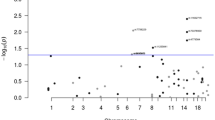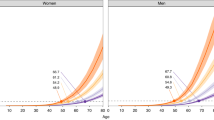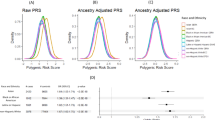Abstract
Increasing single nucleotide polymorphisms (SNPs) have been identified to be associated with colorectal cancer (CRC). We aimed to investigate whether genetic risk scores (GRS) that aggregate information from multiple genetic variants can predict the risk of CRC in a Chinese population. Fifty candidate SNPs were selected to explore the associations with CRC in a discovery sample with 1002 CRC cases and 999 healthy controls. We modeled the significant SNPs identified by the case–control study as a multilocus weighted GRS and estimated the association of GRS with CRC. Furthermore, 300 pairs of cases and controls were included as a validation sample to confirm the finding. Area under the receiver operating characteristic curve (AUROC) was used to evaluate the predictive power of GRS in CRC. A total of seven SNPs were found to increase the risk of CRC, and two SNPs were found to be negatively associated with CRC in the discovery sample. Relative to participants with the lowest quartile of GRS, those with the highest quartile had a 2.64-fold (95% CI: 1.99–3.51) higher risk for CRC. For every 0.1 point of GRS increase, the risk of CRC increase by 11% (95% CI: 8–14%). AUROC for GRS alone were 0.59 (95% CI: 0.57–0.62) and 0.52 (95% CI: 0.46–0.58) in the discovery and validation sample, respectively. AUROC increased to 0.62 (95% CI: 0.59–0.64) and 0.71 (95% CI: 0.65–0.76) by combining environmental risk factors. Our findings support an association between GRS and risk of CRC, which provides evidence of improved prediction model for CRC in China.
This is a preview of subscription content, access via your institution
Access options
Subscribe to this journal
Receive 12 print issues and online access
$259.00 per year
only $21.58 per issue
Buy this article
- Purchase on Springer Link
- Instant access to full article PDF
Prices may be subject to local taxes which are calculated during checkout

Similar content being viewed by others
References
Bray F, Ferlay J, Soerjomataram I, Siegel RL, Torre LA, Jemal A. Global cancer statistics 2018: GLOBOCAN estimates of incidence and mortality worldwide for 36 cancers in 185 countries. CA Cancer J Clin 2018;68:394–424.
Feng RM, Zong YN, Cao SM, Xu RH. Current cancer situation in China: good or bad news from the 2018 Global Cancer Statistics? Cancer Commun 2019;39:22.
Brenner H, Kloor M, Pox CP. Colorectal cancer. Lancet 2014;383:1490–502.
Johnson CM, Wei C, Ensor JE, Smolenski DJ, Amos CI, Levin B, et al. Meta-analyses of colorectal cancer risk factors. Cancer Causes Control 2013;24:1207–22.
Freedman AN, Slattery ML, Ballard-Barbash R, Willis G, Cann BJ, Pee D, et al. Colorectal cancer risk prediction tool for white men and women without known susceptibility. J Clin Oncol 2009;27:686–93.
Theodoratou E, Montazeri Z, Hawken S, Allum GC, Gong J, Tait V, et al. Systematic meta-analyses and field synopsis of genetic association studies in colorectal cancer. J Natl Cancer Inst 2012;104:1433–57.
Nimptsch K, Aleksandrova K, Boeing H, Janke J, Lee YA, Jenab M, et al. Association of CRP genetic variants with blood concentrations of C-reactive protein and colorectal cancer risk. Int J Cancer 2015;136:1181–92.
Dunlop MG, Tenesa A, Farrington SM, Ballereau S, Brewster DH, Koessler T, et al. Cumulative impact of common genetic variants and other risk factors on colorectal cancer risk in 42,103 individuals. Gut 2013;62:871–81.
Hiraki LT, Qu C, Hutter CM, Baron JA, Berndt SI, Bezieau S, et al. Genetic predictors of circulating 25-hydroxyvitamin d and risk of colorectal cancer. Cancer Epidemiol Biomark Prev 2013;22:2037–46.
Law PJ, Timofeeva M, Fernandez-Rozadilla C, Broderick P, Studd J, Fernandez-Tajes J, et al. Association analyses identify 31 new risk loci for colorectal cancer susceptibility. Nat Commun 2019;10:2154.
Ripatti S, Tikkanen E, Orho-Melander M, Havulinna AS, Silander K, Sharma A, et al. A multilocus genetic risk score for coronary heart disease: case-control and prospective cohort analyses. Lancet 2010;376:1393–1400.
Cornelis MC, Qi L, Zhang C, Kraft P, Manson J, Cai T, et al. Joint effects of common genetic variants on the risk for type 2 diabetes in U.S. men and women of European ancestry. Ann Intern Med 2009;150:541–50.
Zhang Y, Liu B, Jin M, Ni Q, Liang X, Ma X, et al. Genetic polymorphisms of transforming growth factor-beta1 and its receptors and colorectal cancer susceptibility: a population-based case-control study in China. Cancer Lett 2009;275:102–8.
Lichtenstein P, Holm NV, Verkasalo PK, Iliadou A, Kaprio J, Koskenvuo M, et al. Environmental and heritable factors in the causation of cancer–analyses of cohorts of twins from Sweden, Denmark, and Finland. N Engl J Med 2000;343:78–85.
Rustgi AK. The genetics of hereditary colon cancer. Genes Dev 2007;21:2525–38.
Jia WH, Zhang B, Matsuo K, Shin A, Xiang YB, Jee SH, et al. Genome-wide association analyses in East Asians identify new susceptibility loci for colorectal cancer. Nat Genet 2013;45:191–6.
Whiffin N, Hosking FJ, Farrington SM, Palles C, Dobbins SE, Zgaga L, et al. Identification of susceptibility loci for colorectal cancer in a genome-wide meta-analysis. Hum Mol Genet 2014;23:4729–37.
Zhang B, Jia WH, Matsuda K, Kweon SS, Matsuo K, Xiang YB, et al. Large-scale genetic study in East Asians identifies six new loci associated with colorectal cancer risk. Nat Genet 2014;46:533–42.
Zhang H, Ma H, Xu Y, Li L. Association of SMAD7 rs12953717 polymorphism with cancer: a meta-analysis. PLoS One 2013;8:e58170.
Hu Y, Sun Z, Zhang A, Zhang J. SMAD7 rs12953717 polymorphism contributes to increased risk of colorectal cancer. Tumour Biol 2014;35:695–9.
Yao K, Hua L, Wei L, Meng J, Hu J. Correlation between CASC8, SMAD7 polymorphisms and the susceptibility to colorectal cancer: an updated meta-analysis based on GWAS results. Medicine 2015;94:e1884.
Chao C, Zhang ZF, Berthiller J, Boffetta P, Hashibe M. NAD(P)H: quinone oxidoreductase 1 (NQO1) Pro187Ser polymorphism and the risk of lung, bladder, and colorectal cancers: a meta-analysis. Cancer Epidemiol Biomark Prev 2006;15:979–87.
Ding R, Lin S, Chen D. Association of NQO1 rs1800566 polymorphism and the risk of colorectal cancer: a meta-analysis. Int J Colorectal Dis 2012;27:885–92.
Wang Y, Zhang G, Luo Y. Association between NQO1 C609T polymorphism and colorectal cancer risk. Tumour Biol 2013;34:4027–32.
Zhao H, Zhu F, Sun J, Meng X. Meta-analysis of the association between NQO1 Pro187Ser polymorphism and colorectal cancer in Asians. Tumour Biol 2014;35:2111–6.
Tenesa A, Farrington SM, Prendergast JG, Porteous ME, Walker M, Haq N, et al. Genome-wide association scan identifies a colorectal cancer susceptibility locus on 11q23 and replicates risk loci at 8q24 and 18q21. Nat Genet 2008;40:631–7.
Peters U, Hutter CM, Hsu L, Schumacher FR, Conti DV, Carlson CS, et al. Meta-analysis of new genome-wide association studies of colorectal cancer risk. Hum Genet 2012;131:217–34.
Hutter CM, Chang-Claude J, Slattery ML, Pflugeisen BM, Lin Y, Duggan D, et al. Characterization of gene-environment interactions for colorectal cancer susceptibility loci. Cancer Res 2012;72:2036–44.
Zou L, Zhong R, Lou J, Lu X, Wang Q, Yang Y, et al. Replication study in Chinese population and meta-analysis supports association of the 11q23 locus with colorectal cancer. PLoS One 2012;7:e45461.
Peters U, Jiao S, Schumacher FR, Hutter CM, Aragaki AK, Baron JA, et al. Identification of genetic susceptibility loci for colorectal tumors in a genome-wide meta-analysis. Gastroenterology 2013;144:799–807.
Whiffin N, Dobbins SE, Hosking FJ, Palles C, Tenesa A, Wang Y, et al. Deciphering the genetic architecture of low-penetrance susceptibility to colorectal cancer. Hum Mol Genet 2013;22:5075–82.
Al-Tassan NA, Whiffin N, Hosking FJ, Palles C, Farrington SM, Dobbins SE, et al. A new GWAS and meta-analysis with 1000 Genomes imputation identifies novel risk variants for colorectal cancer. Sci Rep 2015;5:10442.
Cheng I, Kocarnik JM, Dumitrescu L, Lindor NM, Chang-Claude J, Avery CL, et al. Pleiotropic effects of genetic risk variants for other cancers on colorectal cancer risk: PAGE, GECCO and CCFR consortia. Gut 2014;63:800–7.
Zeng Y, Wei L, Wang YJ, Liu C. Genetic association between ERCC5 rs17655 polymorphism and colorectal cancer risk: evidence based on a meta-analysis. Asian Pac J Cancer Prev 2015;16:5565–71.
Du H, Zhang X, Du M, Guo N, Chen Z, Shu Y, et al. Association study between XPG Asp1104His polymorphism and colorectal cancer risk in a Chinese population. Sci Rep 2014;4:6700.
Qin J, Zhang JX, Li XP, Wu BQ, Chen GB, He XF. Association between the CYP1A1 A2455G polymorphism and risk of cancer: evidence from 272 case-control studies. Tumour Biol 2014;35:3363–76.
Liu C, Jiang Z, Deng QX, Zhao YN. Meta-analysis of association studies of CYP1A1 genetic polymorphisms with digestive tract cancer susceptibility in Chinese. Asian Pac J Cancer Prev 2014;15:4689–95.
Zhou X, Lin C. Survivin and angiotensin-converting enzyme polymorphisms with risk of colorectal cancer: a systematic review and meta-analysis. World J Surg Oncol 2015;13:27.
He L, Deng T, Luo H. Association between cytotoxic T-lymphocyte antigen-4+49A/G polymorphism and colorectal cancer risk: a meta-analysis. Int J Clin Exp Med 2015;8:3752–60.
Zhang B, Jia WH, Matsuo K, Shin A, Xiang YB, Matsuda K, et al. Genome-wide association study identifies a new SMAD7 risk variant associated with colorectal cancer risk in East Asians. Int J Cancer 2014;135:948–55.
Lubbe SJ, Di Bernardo MC, Broderick P, Chandler I, Houlston RS. Comprehensive evaluation of the impact of 14 genetic variants on colorectal cancer phenotype and risk. Am J Epidemiol 2012;175:1–10.
Hsu L, Jeon J, Brenner H, Gruber SB, Schoen RE, Berndt SI, et al. A model to determine colorectal cancer risk using common genetic susceptibility loci. Gastroenterology 2015;148:1330–9.
Park JH, Gail MH, Greene MH, Chatterjee N. Potential usefulness of single nucleotide polymorphisms to identify persons at high cancer risk: an evaluation of seven common cancers. J Clin Oncol 2012;30:2157–62.
Iwasaki M, Tanaka-Mizuno S, Kuchiba A, Yamaji T, Sawada N, Goto A, et al. Inclusion of a genetic risk score into a validated risk prediction model for colorectal cancer in Japanese men improves performance. Cancer Prev Res 2017;10:535–41.
Jiang X, Cai S, Hu Y, Ye D, Li Q, Chen K, et al. Sex disparities in cancer incidence in Jiashan County, China, 1995-2014. Cancer Epidemiol 2017;50(Pt A):46–52.
Lauby-Secretan B, Scoccianti C, Loomis D, Grosse Y, Bianchini F, Straif K. Body Fatness and Cancer–Viewpoint of the IARC Working Group. N Engl J Med 2016;375:794–8.
Wong M, Chan CH, Lin J, Huang J, Huang J, Fang Y, et al. Lower relative contribution of positive family history to colorectal cancer risk with increasing age: a systematic review and meta-analysis of 9.28 million individuals. Am J Gastroenterol 2018;113:1819–27.
Sun CL, Yuan JM, Koh WP, Yu MC. Green tea, black tea and colorectal cancer risk: a meta-analysis of epidemiologic studies. Carcinogenesis 2006;27:1301–9.
Yarnall JM, Crouch DJ, Lewis CM. Incorporating non-genetic risk factors and behavioural modifications into risk prediction models for colorectal cancer. Cancer Epidemiol 2013;37:324–9.
Hosono S, Ito H, Oze I, Watanabe M, Komori K, Yatabe Y, et al. A risk prediction model for colorectal cancer using genome-wide association study-identified polymorphisms and established risk factors among Japanese: results from two independent case–control studies. Eur J Cancer Prev 2016;25:500–7.
Acknowledgements
This work was supported by the National Key Basic Research Program (973 program No. 2015CB554003), and the National Natural Science Foundation of China (No. 81673262 and 81602917). We would like to thank all the patients and control subjects for their participation in this study. We gratefully acknowledge Department of Gastrointestinal Surgery of the Shaoxing People’s Hospital for their valuable help.
Author information
Authors and Affiliations
Corresponding authors
Ethics declarations
Conflict of interest
The authors declare that they have no conflict of interest.
Additional information
Publisher’s note Springer Nature remains neutral with regard to jurisdictional claims in published maps and institutional affiliations.
Supplementary information
Rights and permissions
About this article
Cite this article
Ye, D., Jiang, D., Gu, S. et al. Evaluating the predictive value of genetic risk score in colorectal cancer among Chinese Han population. J Hum Genet 65, 271–279 (2020). https://doi.org/10.1038/s10038-019-0703-4
Received:
Revised:
Accepted:
Published:
Issue Date:
DOI: https://doi.org/10.1038/s10038-019-0703-4



